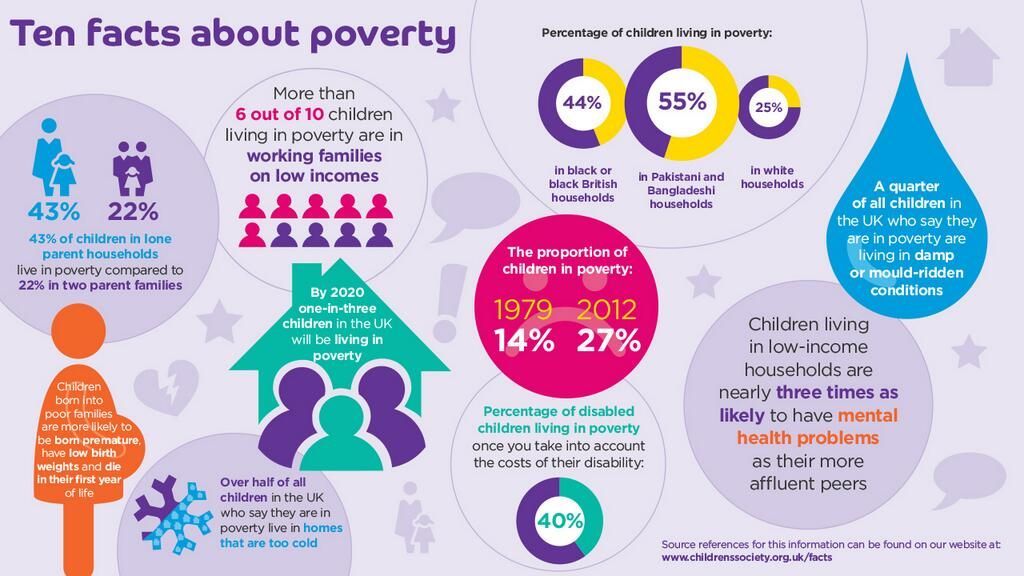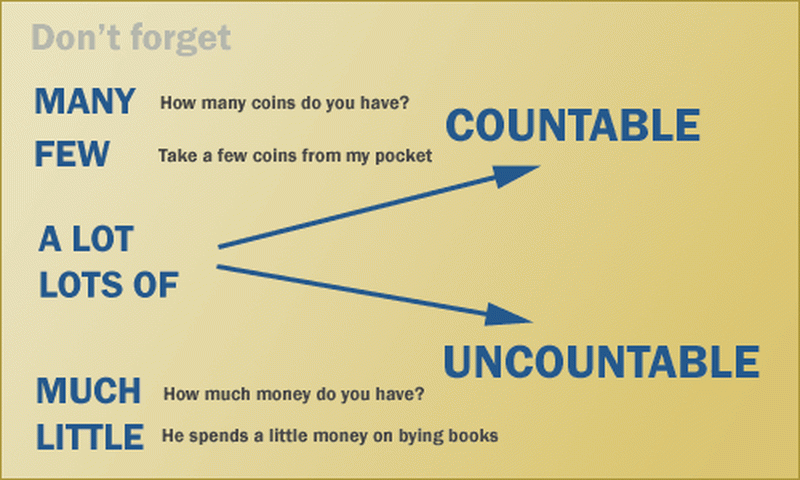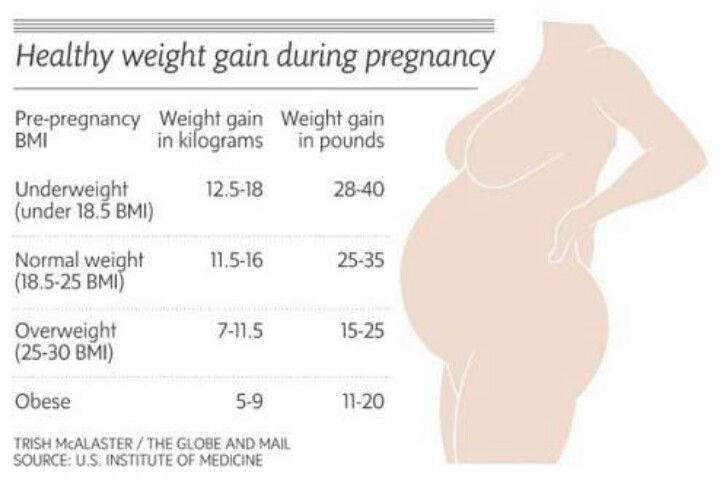Sibling rivalry with new baby
Dealing with challenging behaviour when a new baby arrives
5min read
Many children experience feelings of jealousy towards their new brother or sister, and may convey these feelings through resorting to more ‘babyish’ behaviour, such as having tantrums or refusing to use the potty even though they have been successfully potty-trained for a while. This is all perfectly natural, and is their way of expressing their feelings of frustration, and confusion about their role in your life and their place in the family.
Key Points:
- It is natural for young children to experience feelings of jealousy towards their new sibling. This is all perfectly natural, and is their way of expressing their feelings of frustration, and confusion about their role in your life and their place in the family
- By responding with patience and understanding, your child will start to feel secure again, and know that by making room for a new member of the family, they are not giving up their place or getting any less love from you
- Do allow your older child to be an active part of the baby’s life, by letting them help with looking after their baby brother or sister like helping to change a nappy, or reading to them
On this page
- Understanding what might be behind their behaviour
- Tips for managing this change
- Taking a positive approach
- Further resources
It is completely normal for older siblings to react in this way to the arrival of a new baby, and should not in any way affect their future relationship, particularly if dealt with in an open and non-judgemental way by their parents, so that their feelings of jealousy will diminish over time. Even if your child appears to be independent and capable of doing many things for themselves and without your constant attention, they still need your love and interest just as much as before – maybe now more than ever. These types of behaviour are particularly prevalent in toddlers, who are still so used to having your undivided attention, and were not long ago being breast or bottle-fed by you or falling asleep in your lap.
Tips for managing this change
- If you haven’t had your baby yet, prepare your child for the arrival of the new baby. It might help to look at a children’s book about the subject together.
- Do look through old baby pictures of your first child with them, so they remember that they too had all the same attention and care that the new baby is receiving.
- Do try to spend some time alone with your older child on a regular basis, so they don’t feel they need to compete for your attention.
- Do allow your older child to be an active part of the baby’s life, by letting them help with looking after their baby brother or sister like helping to change a nappy, or reading to them.

- Do encourage your children to resolve their differences themselves as they start to get older.
- When dealing with a toddler, try to make them figure out their own solutions rather than giving in to their demands all the time – if they are disturbing you whilst you’re trying to feed the baby, ask them to play where the baby can’t get in their way – making them feel they can do things the baby can’t, which reminds them that there are perks to getting bigger!
- Don’t make any major changes to your child’s routine when the baby first comes along, such as their sleeping arrangements; try to do this a couple of months before the birth or a few months after the new arrival.
- Don’t make comparisons between your children like, "I wish you’d eat up all your food like your baby sister does". This may make your child feel they're not good enough. Say what you want from them, like, "Try and eat a bit more, then you can go and watch TV."
- Don’t punish them for regressing or acting ‘babyishly’ – understand that it’s just a natural way for them to deal with emotions they don’t understand, such as jealousy.

- Don’t think that sibling rivalry means your children won’t have a good relationship later on – once they have got over the initial jealousy of having to share their parents, there is no reason why they shouldn't learn to live with their new brother or sister.
Taking a positive approach
Try not to punish your older child, as this may lead to them feeling more resentful towards the baby. Although you must explain clearly that they are not allowed to hurt the baby, tell them you know they are not meaning to be naughty and should tell you how they are feeling, rather than taking it out on their brother or sister. Hopefully this should encourage them to open up to you a bit more and feel comforted by the fact that you want to know how to help them feel better.
By responding with patience and understanding, your child will start to feel secure again, and know that by making room for a new member of the family, they are not giving up their place or getting any less love from you. This will help them to accept the baby and start to see that they are also a part of their life, in their role as big brother or sister.
This will help them to accept the baby and start to see that they are also a part of their life, in their role as big brother or sister.
If friends and family are buying gifts for the new baby, it may be an idea to get some gifts to give to your child too so they don't feel left out. You might also want to make up a little box full of treats and fun activities, books and toys from the baby to your child.
Watch our video below on tips on getting the kids involved with the new arrival
Further resources
It may help to chat to other parents on our forums to find out how they are dealing with this issue within their family life. You can also talk to us online via our live chat service, email us at [email protected] or call us on our helpline on 0808 800 2222 to speak to trained family support worker.
Other organisations that may be useful:
Visit the NCT website for ten top tips on managing sibling jealousy
Read this advice from Bounty on introducing a new baby to siblings
Last updated: October 2022
How to handle sibling jealousy with a newborn baby: 10 tips | Baby & toddler articles & support
Whatever happens, there will be a period of adjustment for your oldest child when their baby sibling is born.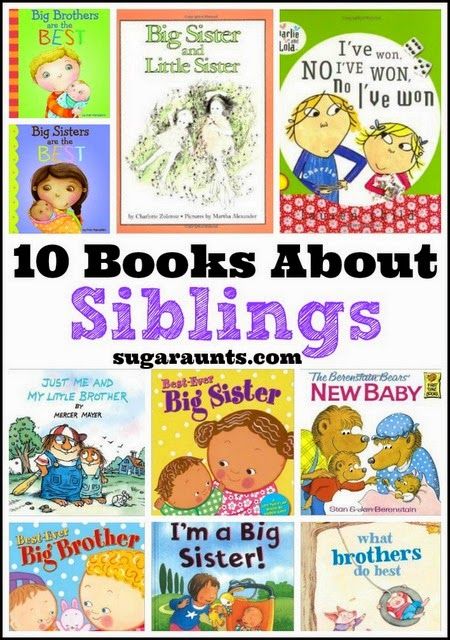 Here’s how to manage it when they feel left out or jealous.
Here’s how to manage it when they feel left out or jealous.
The arrival of a new brother or sister can be unsettling for a toddler. After all they are used to having your undivided attention.
You might find that your toddler isn't as happy and excited about your new baby as you are. Some find it difficult to adjust while others accept the new arrival easily (NHS, 2018). Here’s how to handle the jealousy…
1. Get your toddler involved
You could ask your toddler to pass you the bottle for a feed. You could see whether they will hold the cotton wool while you change their little brother or sister’s nappies. You could even try to persuade them to entertain their sibling with songs in the back seat if they’re upset in their car seat.
Your toddler will love having tasks and feel much more part of things. You will need to guide them as a child's interpretation of a situation may be inaccurate and you should be aware not to expect too much of them (ROSPA, 2018).
2.
 Put your toddler first sometimes
Put your toddler first sometimesNo matter how much you would normally go to your newborn first, a few occasions of putting your baby second can work wonders.
Try ‘telling’ the baby they’ll have to wait to get their nappy changed while you get their older sibling’s snack. You could put the baby on the play mat while you play dollhouse with their big brother or sister. Anything that shows them that right now, at this second, they are number one.
3. Acknowledge their point of view
Being ‘in it together’ with the occasional acknowledgement of their views can make a whole world of difference. Acknowledgements like ‘Yeah, babies do cry a lot don’t they?’ or ‘I bet you wish sometimes we could hang out alone’ will let them know you get it.
Parents who develop open, participative communication with their children help their children to manage stress well. That helps them to develop resilience (Joseph Rowntree Foundation, 2007).
4. Be prepared for toddlers hitting or other aggression
Yep, however much you hate it, probably your toddler will at some point turn on their sibling.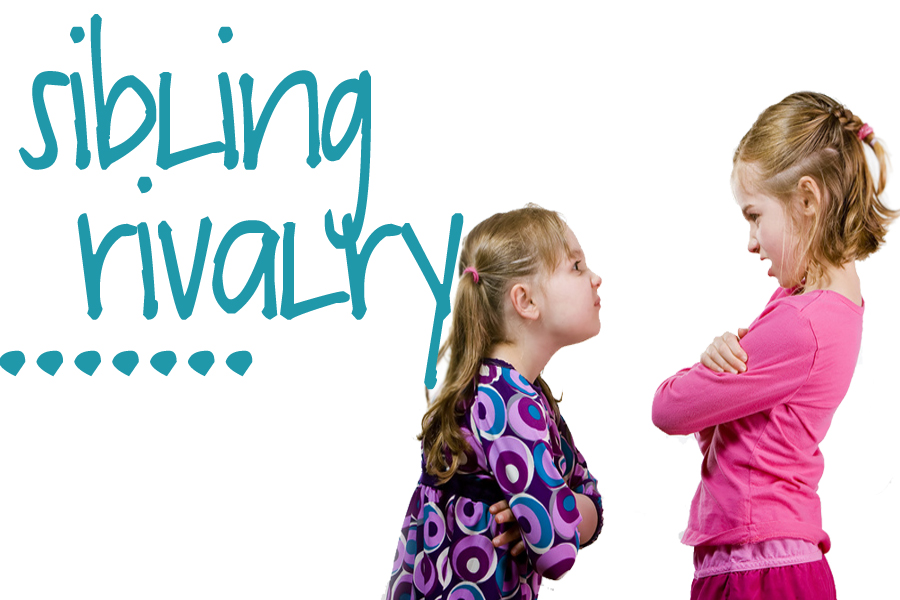 One study found 46% of children said they had been victims of sibling aggression, while 35.6% admitted they had been aggressive to their siblings (Tippett, 2014).
One study found 46% of children said they had been victims of sibling aggression, while 35.6% admitted they had been aggressive to their siblings (Tippett, 2014).
Toddlers might throw a toy at their sibling, pinch them or hit them. And you’re likely to be tempted to shout at them. The thing is: that was kind of their aim. Instead, give your attention to making sure the baby is ok and then they’ll think that was a waste of time and (hopefully) not bother again.
Positive parenting and good relationships within the family reduce levels of aggression. Yet harsh parenting is associated with increased levels of aggression (Tippett, 2014). You could try to encourage your eldest to talk about any anger or jealousy they feel towards their younger sibling. These are normal emotions and it is better for them to talk about them than to bottle them up (Wallace, 2016).
5. Don’t compare your toddler with your newborn
Asking your older child why they can’t be more like their baby brother or sister is unnecessary and unhelpful.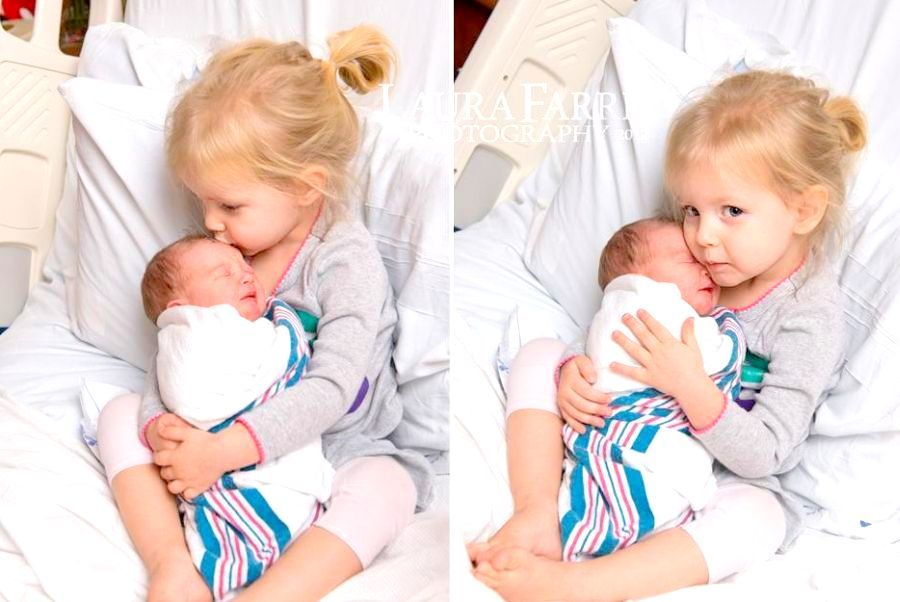 Don’t be tempted – even when you’re tired and stressed out.
Don’t be tempted – even when you’re tired and stressed out.
6. Stay alert with toddlers for a while when you have a newborn
Much as it would be lovely to be able to leave your children alone together and know they’d be fine, this is the real world. For a while, you’ll have to be close to hand to know that your older child won’t hurt your baby – even accidentally – when you’re not there to monitor.
Children under the age of four are most at risk of an accident at home (Rospa, 2018). Many accidents are caused by horseplay, involving pushing, shoving and wrestling.
Other things to be careful about are heavy objects, such as furniture and televisions, being pushed or pulled over on to younger babies or children. Children might see sets of drawers as ideal climbing frames but they can pull over easily if unsecured. Children can also swallow, inhale or choke on items like small toys, peanuts and marbles (Rospa, 2018).
If your toddler begs to hold his new sibling, sit your toddler on the floor on a soft surface and help them to support the baby.
7. Get help with the baby so you can spend one-on-one time with your older child
Nothing can make your older child feel better about their feelings towards their sibling than hanging out with you and you alone. If you’re breastfeeding and can’t leave your newborn for long, even a quick trip to the park can make them feel they’ve got your undivided attention again.
The quality of the parent–child relationship at home can influence cognitive and socio-emotional outcomes for pre-school children (Department of Education, 2017).
8. Point out how much the baby likes their older sibling
Saying ‘Look how much they love you’ and ‘They won’t stop watching how good you are on your bike’ will make your older child feel like they’re really involved in making their younger sibling happy. Warm, authoritative and responsive parenting helps children to manage stress. By boosting their confidence they will respond better to the change in their lives (JRF, 2007).
9.
 Keep toddler routines as much as possible
Keep toddler routines as much as possibleToddlers are creatures of habit. So if you can sling some clothes on and drag yourself to their usual music group, even in the early weeks, it will make a massive difference to how they feel. After all, this is a huge upheaval in their lives.
Try with the smaller stuff too, like reading them a bedtime story or eating your usual breakfast. Participation in routines like reading or storytelling are associated with higher social and emotional school readiness among preschool-age children (Munzi, 2014). Going to playgroup, visiting friends and telling a bedtime story might be difficult to organise in the first few weeks. But sticking to established routines will help reassure your toddler (NHS, 2018).
10. Remember that it won’t last for ever
When young children are feeling jealous of baby siblings, it can feel like a phase that will never end. But – like them all – it will. And before you know it, they’ll be best of mates (and ganging up on you). Remember too that both your baby and toddler are gaining socially and emotionally by having a sibling (Hughes, 2011).
Remember too that both your baby and toddler are gaining socially and emotionally by having a sibling (Hughes, 2011).
This page was last reviewed in June 2018
Our support line offers practical and emotional support with feeding your baby and general enquiries for parents, members and volunteers: 0300 330 0700.
Make friends with other parents-to-be and new parents in your local area for support and friendship by seeing what NCT activities are happening nearby.
Sibling rivalry - causes and solutions
"Having one child makes you a parent, and having two children makes you a judge."
Your child is at the center of the universe in your life. Every decision you make is in his best interest. The child is also aware of this privileged position and enjoys the attention of parents. However, their ideal life changes the day you bring another child into your life. The birth of a sibling can be a stressful event in your child's life.
What does sibling rivalry mean?
Brothers and sisters can be best friends or worst enemies. Depending on the situation they are in, they can either love or hate each other, but they cannot ignore their presence in each other's lives.
Depending on the situation they are in, they can either love or hate each other, but they cannot ignore their presence in each other's lives.
Brothers and sisters often quarrel and then compensate each other. While it can be frustrating to see your kids fighting over trifles, it shouldn't be a reason to lose your mind. But you can reduce the frequency of quarrels and promote peace in your home by setting a few ground rules.
What causes rivalry between siblings?
Sibling rivalry begins shortly after the birth of a second child and will continue throughout his or her adulthood. They compete for everything from parental attention to play - everything they have in common can become a potential conflict zone. In a way, that's great because they'll learn to compete, share, and compromise. These traits can help them build relationships later in life. Some of the reasons for this rivalry could be:
- Jealousy As a firstborn, your child is used to getting all of your attention.
 Now they will have to share you with someone else who can do next to nothing and is completely dependent on you. This can make your child feel abandoned because now all the attention is on this newcomer to the family. As they grow, jealousy may increase when you ask them to share their toys, rooms, bed, clothes, books, etc.
Now they will have to share you with someone else who can do next to nothing and is completely dependent on you. This can make your child feel abandoned because now all the attention is on this newcomer to the family. As they grow, jealousy may increase when you ask them to share their toys, rooms, bed, clothes, books, etc. - Comparison It is very common for parents, friends or relatives to undergo a Sibling Comparison procedure. It can be a comparison based on their appearance or temperament, character, communication, behavior, hobbies, eating habits, skills, etc. This can make them feel inferior compared to their siblings and can cause a long rivalry.
- individual mood Every child is unique and will have a different temperament. Their temperament, character, adaptability, etc., will form part of their personality. She will play an important role in how she gets along with others. Some of the children of the introverted Brothers may not bother them with a vengeance.
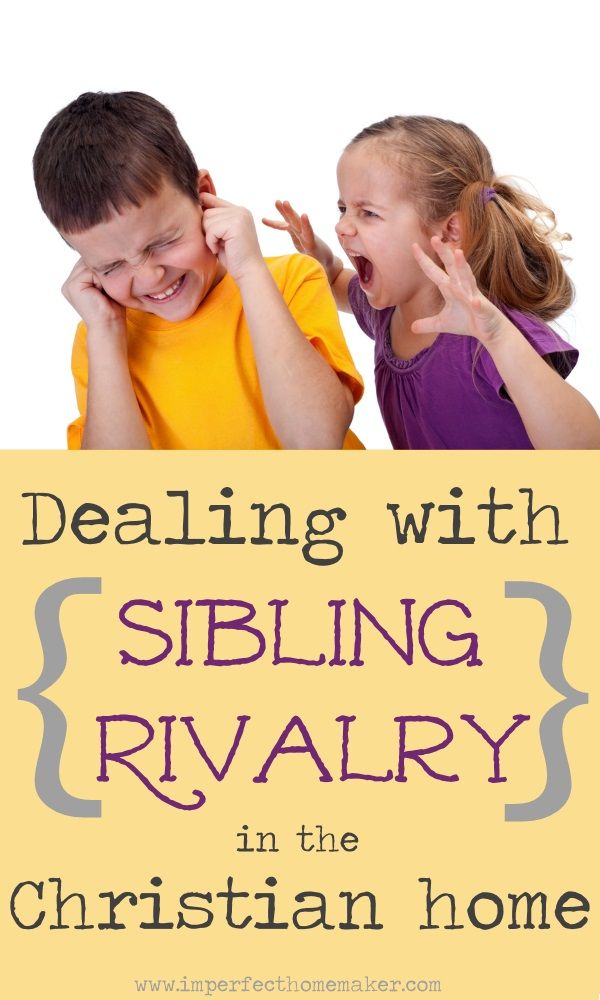 Others may need more love, care, and attention. Conflict personalities, possibly due to resentment. The same personality traits can cause conflict because both children will need the same amount of attention.
Others may need more love, care, and attention. Conflict personalities, possibly due to resentment. The same personality traits can cause conflict because both children will need the same amount of attention. - Special Needs / Unstable Child Sometimes a child may have special needs due to illness, slow learning, emotional needs, or physical disabilities. This will require the parent to devote more time to them and may cause another child to be jealous of their sibling.
- changing needs - in most families The youngest child will inherit the things that the older brother uses, which makes him jealous that he cannot get new things. Similarly, an older brother or sister may have a special attachment to his possessions and be reluctant to share it. As they get older, they develop a sense of individuality and may resent taking care of their siblings or sharing household chores. They will not want to play with someone from a different age group and may look forward to spending more time with their friends.

- Role models. Your children will learn from you. Make sure you give valid examples, if you respectfully analyze conflicts with your partner, they will learn. If you behave aggressively in their presence, be sure that they will behave in the same way.
Rivalry between children
When you can't handle a baby's hostility towards a newborn, you'll want to curl up in a corner and cry. You are already experiencing postpartum stress and your baby's hostile behavior may exacerbate your distress.
Think from a child's point of view. It is also a difficult time for them. It will be difficult for them to accept the newborn as part of life. They are accustomed to undivided attention and are deprived of this privilege. They will show their annoyance with bad behavior, yelling and crying. Some may go so far as to make unnecessary demands, steal, break things, harm a child or even themselves. They may be bothered by the constant crying of a newborn or simply because you give the baby more time. Their demands can be as ridiculous as being carried on your knees, rocked on your bed, using a drinking mug, eating baby food, or sleeping next to you.
Their demands can be as ridiculous as being carried on your knees, rocked on your bed, using a drinking mug, eating baby food, or sleeping next to you.
You will find it difficult to deal with this aggressive relationship, and how you deal with the situation at this stage will form the basis of their long-term relationship.
How to prepare a child for a newborn?
It is advisable to prepare your baby before birth to ensure a healthy bond between them.
- Inform them of the birth of the child so that they can relate to them.
- Involve them during pregnancy by allowing them to touch your baby on your belly or talk to your baby in your belly. Take them to the gynecologist and look at the ultrasound or listen to the heartbeat.
- Tell them about the benefits of having a sibling so they can count on a partner and friend instead of looking at the baby as a competition.
- While one parent is busy with the newborn, the other parent needs to spend quality time with them, so your child will have no trouble coping with parental time conflicts.
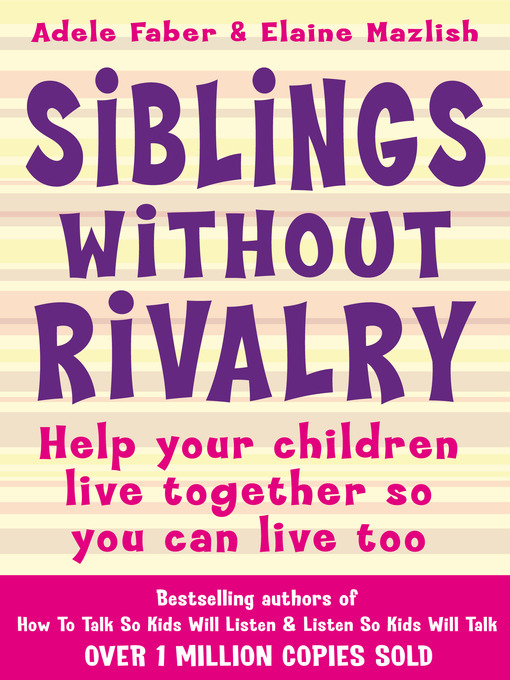
- As soon as the baby is born, involve the baby in caring for him. Let them choose clothes or toys for the newborn and help set up the nursery. It would be good to make them feel responsible for the safety of the child. Let them hold the baby in their arms so they can bond.
Even when you are busy with your baby, give him some time every day. - Involve your child in feeding your baby. You can encourage your child to make funny faces, dance and sing. They will be more than happy to spend time with you and give a brother a smile.
- Be prepared for occasional temper tantrums and aggressive behavior.
How to deal with sibling rivalry
Like it or not, fighting kids will always be a part of every parent's life. How you handle the situation will be the foundation of their relationship. Establishing ground rules from day one will ensure family peace in the long run. They will have to learn how to compromise, negotiate, control their anger, understand the point of view of others and, finally, let go of the situation and start over.
- Don't get involved in every little fight. Let them try to fix the problem before you feel the need to intervene. This will only increase their dependence on you if you solve all their life problems.
- Physical damage must be a strict number. No situation should equate to violence.
- Watch the language you use and make sure it doesn't use a name or offensive words. If you hear inappropriate language, find a source they could learn from.
- Don't take sides or do favors, be fair and listen to both sides of the story. Encourage children to be tidy, not solve problems for them.
- Separate the children until they calm down. Sometimes just separation gives them time to think.
- Do not focus on finding out who is responsible for the fight. It takes two to fight - so both are responsible.
- Do not compare children based on their skill levels, eating habits, academic performance, etc. Each child is unique and will have different talents and traits.
Comparisons can only lead to rivalry.
- Share your time with each child and give them individual attention each day.
- Do not use violence to end an argument. You will only force them to use violence as a tool to end conflicts at some point in their lives.
- Treat all your children equally. Either they learn to share, or no one understands it. For example, if they want to play the same game, let them take turns or delay the game until they agree to share.
- There can be tantrums, fights, whining and fights, but as a parent you have to deal with it.
Tips for Stopping Sibling Rivalry
1. Help Children Coexist
You can help your children get along by setting a few rules. They apply to both parents and children to ensure that the problem of sibling rivalry is resolved.
- If the children have different interests, take the time to meet the needs of both.
- Let them spend time with friends and siblings.
Make sure they spend time together.
- Enjoy time with the whole family. Plan walks, vacations, movies, picnics and let them come together.
- Let them resolve their conflicts and only participate when needed
- Schedule the things they will have to share.
- If necessary, seek professional help to resolve sibling rivalry.
2. When a sibling is disconnected
Parenting comes with its own challenges, and these can be exacerbated if the sibling has special physical or emotional needs. The parent will need to spend more time with the disabled child and balance their time with non-disabled siblings. The parents end up busy caring for their disabled brother and ignoring the needs of the other child. This can lead to a lot of resentment and hatred at some point in life. This stress can be relieved by involving children in the caregiving process and spending quality time with them.
3. When a brother or sister is talented
Every child is talented in their own way. They may have different abilities and talents. Don't compare her especially in front of others. Make them feel loved and special. Recognize their talents and help them develop their strengths. You can mention your weaknesses and help them overcome them.
conclusion
Caring for more than one child - do not walk in the park. Sibling rivalry is an inevitable part of growing up with kids who have siblings. Your job as a parent is to manage conflict to the point where it can turn into an opportunity for your children to grow as individuals.
Rivalry between children: what to do for parents
For parents
Rivalry between siblings can manifest itself in many ways: from simple demands of parental love to aggressive skirmishes and fights. This is one of the most common family problems that worries many parents. Individuals with completely different characters grow up in one family: they are forced to somehow coexist and settle endless disagreements.
On the one hand, this is a great opportunity to learn communication and conflict resolution skills.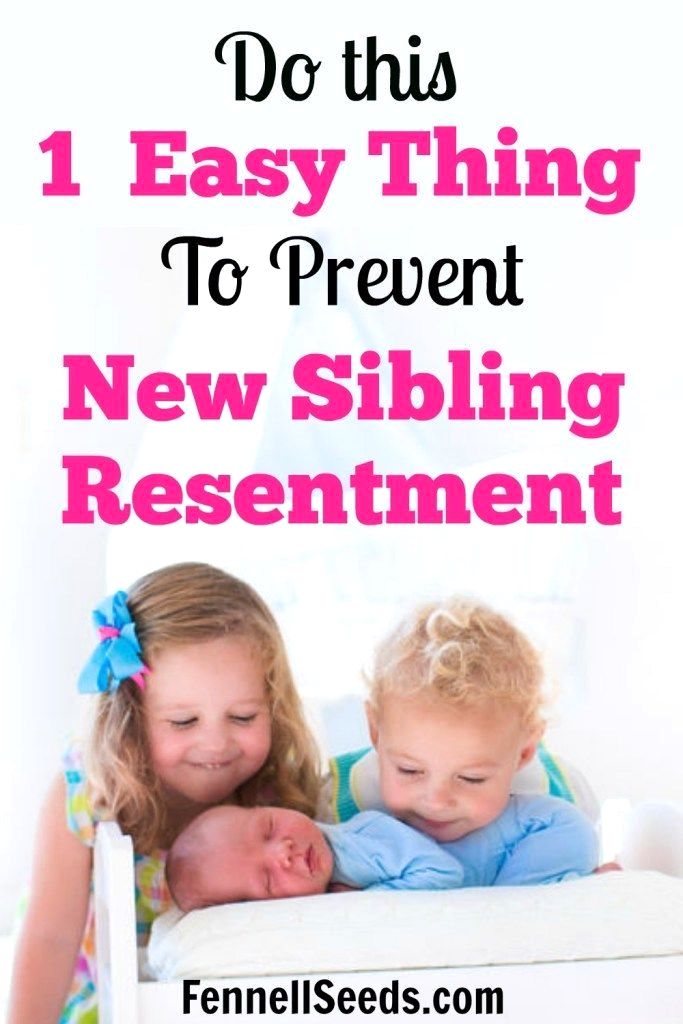 On the other hand, it is very frustrating for parents and children themselves. Sometimes rivalry turns into open hostility: siblings have been harassing each other for years. Parents should know how to deal with this in order to save their own nerves and maintain a calm and friendly atmosphere in the house.
On the other hand, it is very frustrating for parents and children themselves. Sometimes rivalry turns into open hostility: siblings have been harassing each other for years. Parents should know how to deal with this in order to save their own nerves and maintain a calm and friendly atmosphere in the house.
Why there is rivalry between children
Getting along with another person is not so easy. Quite often scandals break out because of things: everyone wants to take possession of a limited resource. If children share one room, there is always a reason for a quarrel, and minor disagreements are simply inevitable. Almost all parents who have two or more children note some level of competition, but its roots can be different.
Most experts believe that the main role is played by the struggle for parental love and approval. There are other factors that increase internecine conflict:
- alleged or real parental favoritism;
- different temperaments and characters;
- the need to protect one's property: for example, a child is worried that his younger brother will steal his favorite blanket;
- jealousy: the older child is jealous of the newborn because he gets the lion's share of the attention;
- family conflict resolution style: when parents argue aggressively and break out into shouting;
- inability to cope with a conflict situation: it is simply difficult for young children to control their emotions;
- adults encourage aggression: if parents ignore a fight or laugh when one child teases another;
- brother or sister is perceived as a rival;
- twins or twins grow up in a family: competition increases many times when parents and other adults begin to compare them.

According to some studies, rivalry between young children is much more common than between teenagers. Thus, children from three to seven years old have an extremely high level of conflict: on average, they argue 3.5 times per hour.
How rivalry affects children and parents
Rivalry between children often drives parents to despair, because all they do is separate opponents. Endless educational conversations require considerable effort and nervous tension. In addition, constant squabbles make it difficult to give children full attention, both all at once and individually.
Some parents try to be philosophical about children's rivalry and be patient. Others worry that it will negatively affect behavior at school, relationships with friends, or growing up. Rivalry affects children in different ways. In some cases, quarrels with a brother or sister cause a lot of stress and confusion, especially when the child feels that he is less loved or not considered for his needs.
Sometimes children's rivalry turns into violence. According to the National Survey of Children's Exposure to Violence (2013), attacks on siblings are depressingly common. The percentage of such cases is especially high among children with an age difference of less than two years. Thus, 40.9% of them reported that over the past year they had been beaten more than once, and 7.7% that they had been thrown at them with weapons and severely injured.
It is important for parents to understand that their decisions should be based primarily on the needs of the children, and not on the notorious justice
Chronic assault, where one child is usually the victim and the other the tormentor, can lead to serious neurotic disorders. It causes childhood post-traumatic disorder (PTSD), depression, anxiety, learning and social difficulties, and relationship problems in adulthood.
On the other hand, competition provides certain advantages. Siblings learn social skills from each other. Early experience of conflict resolution prepares the child for many adult disagreements, including developing the ability to get along with other people: for example, roommates or spouses.
Siblings learn social skills from each other. Early experience of conflict resolution prepares the child for many adult disagreements, including developing the ability to get along with other people: for example, roommates or spouses.
According to a 2013 study, fifth graders who were only children had weaker interpersonal skills after five years of attending school. This trend suggests that the ability to manage conflict, acquired in skirmishes with siblings, continues to be of great benefit, even after the child enters school and spends most of the day with other children.
How to prevent rivalry between children
The phenomenon itself is not unusual, but not all childhood rivalry is considered normal or healthy. “While many parents tend to view sibling strife as something natural, childhood rivalry can negatively impact mental health and lifelong. He should be treated as a potential threat, the same as bullying and bullying, ”explains family therapist Kathy Hardy Williams.
“It is important for parents to understand that their decisions should be based primarily on the needs of the children, and not on the proverbial fairness,” continues Williams. - We used to think that justice is when everyone gets equally. But in fact, justice is when everyone gets what he needs. Parents who can teach their children this principle will do them an invaluable service.
She is echoed by research on interventions in childhood rivalry, which points to the need to encourage friendships between siblings. During it, 12 extracurricular activities took place, where children from the same family were taught positive friendly communication. They were asked to perceive each other as members of the same team, after which the authors noted that their mutual attachment was significantly strengthened.
Find time to interact with each child. Then it will be easier to see their unique qualities and develop talents
There are other effective strategies: if a new addition is expected in the family, prepare the child for the birth of a baby, talk to him about it so that he feels like an important part of the process. Do not allow sudden changes in the life of an older child with the advent of a newborn. Be consistent, demand compliance with the rules without discounting age.
Do not allow sudden changes in the life of an older child with the advent of a newborn. Be consistent, demand compliance with the rules without discounting age.
Brothers and sisters hurt each other more often if such behavior is ignored. It is very likely that the younger child, who is allowed to take anything without the permission of the older one, will do the same when he grows up. Intervene in conflicts where there is a clear desire for unilateral gain or physical force is used.
Do not single out favorites or compare children. Do not set one child as an example to another. Refrain from negative comparative assessments of appearance or gender. Don't force twins to wear the same clothes and don't expect them to behave the same way. Find time to interact with each child. Then it will be easier to see their unique qualities and develop talents.
If you are accused of having a pet
A child who tells his parents that they love another more is going through real grief.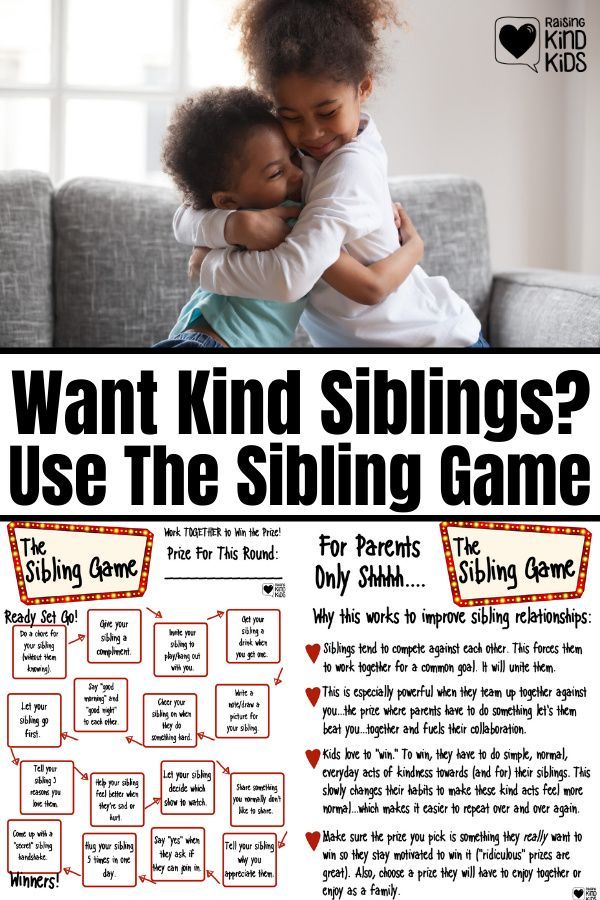 Parents should not dismiss his worries, even if they do not have a pet. It is important to understand how he feels and help him deal with those emotions.
Parents should not dismiss his worries, even if they do not have a pet. It is important to understand how he feels and help him deal with those emotions.
Ask these questions:
- Why do you think I have a pet?
- What can I do to make you feel that you are very loved?
- Do you miss my attention?
- Let's think about how to improve your relationship with your brother (sister)?
- Maybe I can try to reconcile you?
Think about it: maybe you are accused of being biased for a reason? It often happens that one child is closer in spirit. For example, it is difficult for a father who is in love with sports and active games to find a common language with a son who prefers to read books calmly. Always ask for his opinion when planning joint activities, and try to understand what he is interested in.
Pay attention to the unique personality traits and talents of each child. Praise them not only for successes that are important to your self-esteem, but also for everything that is important to them personally.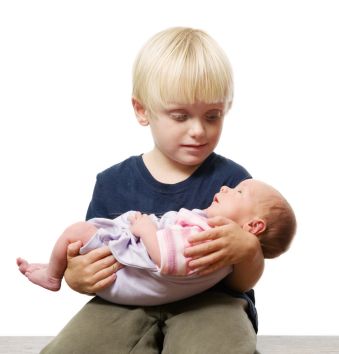 The aspiring artist cares more about whether you like his drawings than about being rewarded for getting good grades. Think about the child's feelings, not about how true his accusations are.
The aspiring artist cares more about whether you like his drawings than about being rewarded for getting good grades. Think about the child's feelings, not about how true his accusations are.
Love is not measured in portions, so it will not work to “prove” that you treat all children equally. If you can make the child feel that he is truly loved, it is likely that the need to fight with brothers and sisters for your favor will disappear by itself.
When to see a family therapist
Family therapy helps with many forms of childhood rivalry. It's never too early to try and never too late. The help of a specialist is useful even with minor manifestations of hostility.
Therapy is highly recommended in the following cases:
- Rivalry between children has become a source of chronic stress for parents or for themselves.
- Parents tried countless ways to improve relationships between their children, but nothing worked.
- Bullying and physical abuse continues.

- One or more children have special needs that increase the competitiveness.
- There has been a major change or loss in the family, such as a divorce or the death of a loved one.
- Parents cannot overcome difficulties in communicating with one or more children, for which they are accused of bias.
The task of a competent therapist is to help each family member express their feelings. With his support, relatives will be able to agree on what to do with children's rivalry and reach mutual agreement.
About the author: Zahn Willines is a behavioral psychologist and addiction specialist.
Text: Elena Anisimova Photo Source: Getty Images
New on the site
5 favorite fairy-tale characters who set a bad example for children
“I envy my younger sister and friends because they have a busy personal life”
6 signs that our difficulties in career and business are related to childhood history
Losing weight for the New Year is dangerous for health.

